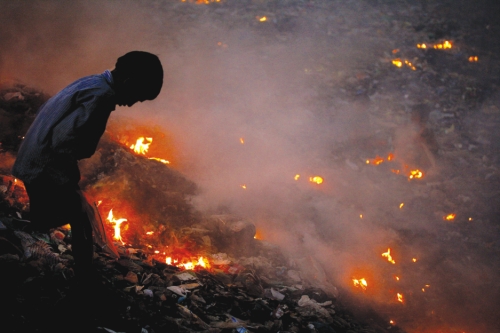
Inside
|
Giving Away Our Share Farid Bakht questions why the World Bank should get a bite out of Bangladesh's share of the climate change pie A few yards from the Royal Albert Hall, British Minister Douglas Alexander was grandly offering Bangladesh $25 million a year, over five years, to protect itself against climate change.
On the same day, a jury in Kent in England was deliberating over six environmental campaigners who had tried to paint the name of the UK prime minister onto part of a massive coal plant. The jury decided that direct action causing minor damage was justified to prevent the greater damage caused by climate change. The six were acquitted. A minister can make an eloquent speech about how we need to do something for countries like Bangladesh -- innocent victims of 200 years of Western industrialisation. Meanwhile, the rest of his colleagues continue to promote a whole new generation of coal-fired power stations. It is not clear what Mr. Alexander's position is on power generation, or whether he believes the building new coal plants such at the one in Kingsnorth suggests that Britain is on its way to become a low- carbon economy. A case of the right hand not knowing what the left is doing, or, should one say, pretending not to know? Despite all the noise, conferences and speeches, the industrialised countries are still spewing out carbon which will destroy many a poor country. They prefer to talk the talk, rather than walk the walk. Money for Nothing The current Bangladeshi regime sent a delegation to sign an agreement with the UK early September. It was justifiably proud to inform us that it would put $45 million of the country's own money on the line. Unfortunately, two senior functionaries (advisers) spoiled the mood by strongly hinting they wanted the World Bank to run any subsequent "Trust Fund." Huddling together with the World Bank representative, the body language suggested a deal had been done and was being gently trailed. The groans from some in the audience sent a clear message. However, the Bank is a past master in sidestepping popular opinion. Keep an eye out on who gets the plum jobs for this fund once this administration decides to pack it in. One may wonder how anyone can trust the World Bank to manage a climate change fund, after the way it has championed the cause of market-led, carbon-intensive non-development for over six decades. The same Bank that has been pressuring Bangladesh since the early nineties to sell off its gas and coal cheaply to Western energy multi-nationals. The kowtowing to the donors is typical of subservient regimes where the elite are only too happy to play to the tune of an aid donor, in return for a seat at the high table. This regime is no better or worse than the rest, in that regard. While Bangladeshis abroad in dozens of countries send several billion dollars more every year than any donor aid pledge, they are continually side-lined in practical terms. Some of the delegates did notice they were in London and so made the usual noises of how they hoped "probashis" would join in this new aid circus et cetera. I have heard this so many times and know it is utterly meaningless. The 39-strong group flew in just for one day of "business" and no attempt was made to, say, do a road show to mobilise Bangladeshis settled here. With a radical change in policy, we would buy in consultants at half the price and finance our own development. This political generation is not interested. With the very future of that state in doubt in the medium-term, what is needed is new nationalist thinking that breaks out of the dependency culture. Without that sense of purpose and vision, any rescue mission will fail. How else can it succeed against rising sea levels or the devastating consequences the Himalayan glaciers' meltdown (with its impact on the gigantic rivers such as the Ganges and Brahmaputra)? In this environmental war, the key will be organisation, mobilisation, and leadership. This year we saw the contrast between the inhumane response of the Burmese authorities after its cyclone in the Irrawaddy delta and the Chinese's efficiency after their earthquake.
A Violation of Human Rights In any issue of reparations, it is not the place for one that has committed (however unwittingly) an environmental injustice to decide how, where, and when the victim spends those resources. Well, not unless you belong to the "foreign aid" bubble. Is it any wonder so many people care so little for "ministers" when you see so much of the elite give up without trying, even when this is an existential issue? With elections, the elite throw up their hands and ask for foreign intervention. With climate change, the elite are suggesting they cannot be trusted with the money and need an external arbitrator. In that case, why have a flag or a state, then? As the better half of "civil society" stood up against the cheap export of national resources earlier this decade, I hope they regroup to campaign against this administration (and any following) and insist that Bangladesh alone must decide how to meet its destiny and manage its fight against the ravages of climate change. Farid Bakht is a policitcal analyst. |


